I have heard all sorts of bullocks about Split Second. Two main classic sayings are: “it cannot be countered” and “it locks up the stack”. The first is just a lie, the second is blatant heresy. Well, time has come to eradicate these prejudices.
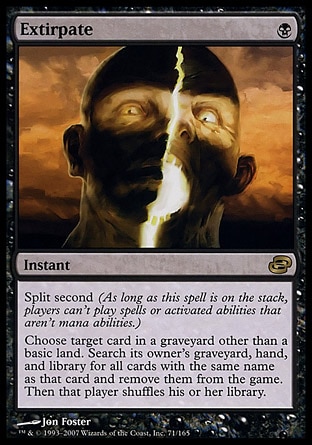
Oracle Text:
Instant
Split second (As long as this spell is on the stack, players can’t cast spells or activate abilities that aren’t mana abilities.)
Choose target card in a graveyard other than a basic land card. Search its owner’s graveyard, hand, and library for all cards with the same name as that card and exile them. Then that player shuffles his or her library.
Extirpate is a black instant spell. As any other instant spell, Extirpate may be cast only when you have priority. This means, among other things, that you cannot fling in your opponent’s play before he or she passes priority to you:
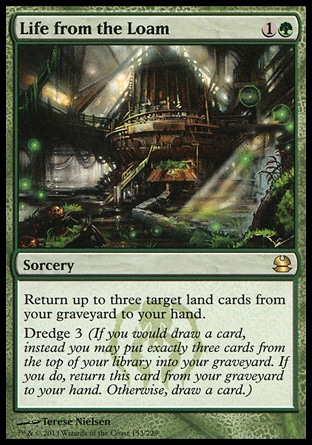
If your opponent decides to dredge, at that moment you do not have priority, since a card may be drawn either at the time of one’s draw step as a turn-based action, or at resolution of an effect instructing to do so. And since you do not have priority, you cannot Extirpate Life from the Loam which the opponent decides to put into his or her hand.
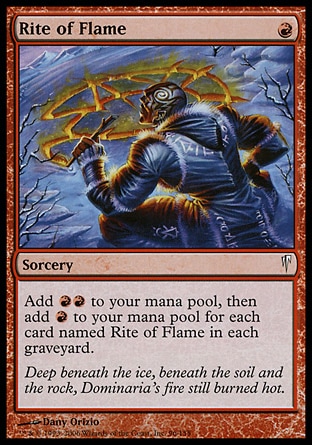
If your opponent has two copies of Rite of Flame in hand and none in graveyard, this isn’t a situation when Extirpate is useful. Until the first copy resolves you have nothing to target. You cannot fling in between resolving the first and playing the second, as you don’t have priority. You will have the space to play Extirpate only after the second one is cast, but it will be on the stack by that time, so it won’t get exiled.
Extirpate targets a card in a graveyard. Since its text states specifically “a graveyard”, it means any graveyard, yours or any of your opponent’s.
Extirpate cannot target basic land cards. Let me remind you that basic lands are only those that have the supertype Basic.
Since Protection is a static ability that functions while the permanent with it is on the battlefield, Extirpate may target cards with relevant Protection:
Extirpate has Split Second, and we shall discuss this ability in some details:
Split Second
Let’s turn to the rules for a minute.
702.61a. Split second is a static ability that functions only while the spell with split second is on the stack. “Split second” means “As long as this spell is on the stack, players can’t cast other spells or activate abilities that aren’t mana abilities.”
702.61b. Players may activate mana abilities and take special actions while a spell with split second is on the stack. Triggered abilities trigger and are put on the stack as normal while a spell with split second is on the stack.
702.61c. Multiple instances of split second on the same spell are redundant.
To sum up the mentioned rules, everything Split Second does is prohibit players from casting other spells and activating nonmana abilities.
At this point I would have saved the file, uploaded it to the site and stormed off to get coffee. But unfortunately, players have little concept of the rules for the game they are playing. So, as they say, “let’s move on” by scrutinizing the phrase I highlighted above.
- prohibit players
- meaning: all players, not only the opponents of the player in control of the spell with Split Second.
- from casting other spells
- meaning: “casting”!! It’s vital to understand that a spell may appear on the stack by other means than being cast. Those who don’t know by now what it means to cast a spell should learn it. The sooner the better.
If an effect instructs or allows you to cast a spell (such as, say, Miracle trigger), the ban retains power. This part of effect is simply ignored. - activating nonmana abilities
- meaning:
a) Split Second isn’t bothered at all with triggered and static abilities;
b) mana abilities may be activated.
More details about such a ban may be found in the article on Pithing Needle.
Split Second cannot do anything else!
- It doesn’t “lock up the stack”. This epic phrase is total bullocks. How can you lock up the stack? It’s a game zone, not a jar of jam! Can you lock up your hand? Damn right you cannot!
- Split Second doesn’t deprise players of priority! And when one has priority, many things can happen, trust me!
- Split Second doesn’t make a spell uncounterable. These spells can be countered quite easily if, of course, you do not limit your views on counter-Magic to just Counterspells played in response.
- Split Second does not prohibit to perform special actions and to activate mana abilities.
- Split Second has no influence whatsoever on triggers. They go off, get onto the stack and resolve happily.
- Split Second doesn’t give a hoot about spells and abilities already on the stack. It doesn’t matter how exactly they ended up there if they had already been cast/activated by the time the spell with Split Second was placed onto the stack.
- And, most obviously, as soon as the spell with Split Second leaves the stack (resolves, gets countered or exiled), the ban on casting spells and activating abilities wears off.
What in the world are special actions?
There are 10 special actions in total:
- Playing a land.
You may read more about lands in articles on: Dryad Arbor, Mishra’s Factory and Valakut the Molten Pinnacle. - Turning a face-down permanent face up (not transforming!). This action is allowed by abilities Disguise and Cloak, Morph and Megamorph and keyword action Manifest.
- Performing an action that an effect allows a player to perform at a later point, usually to prevent a delayed triggered ability from going off, or to end a continuous effect.
For instance, paying {U} in order to prevent Quenchable Fire’s trigger.
Do not confuse it with Killing Wave’s effect which demands payment on resolution! - Performing an action in order to ignore an effect of a static ability for a period of time, provided that the effect of that static ability allows such an action.
For instance, paying {2} to get permission of Leonin Arbiter to search a library until the end of current turn. Or sacrificing a permanent for Damping Engine. - The ability of Circling Vulture: “You may discard Circling Vultures any time you could cast an instant.”
- Suspending.
- Paying {3} to put the companion card from outside the game into the hand.
- Paying {2} to exile a card with foretell.
- Rolling the special die in the Planechase game.
- Turning a Hidden Agenda card in your Command zone face up.
You can only perform a special action when you have priority.
Special actions do not use the stack.
Nota bene: Unfortunately, if a spell with Split Second is on the stack, a card cannot be suspended. Aside from having priority, this special action also requires matching the condition “you can play this card by putting it from your hand on the stack”. And since spells cannot be cast, the condition isn’t matched.
How can a spell with Split Second get countered?
Obviously, the best helpers are triggers which cannot be stopped by (almost) anything.
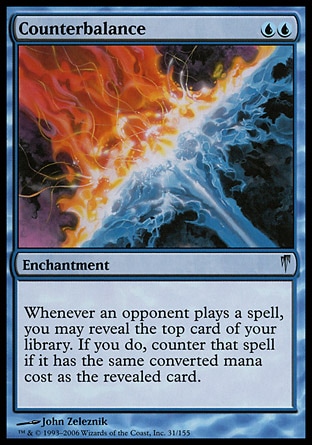
As soon as your cunning opponent casts a spell with Split Second, Counterbalance’s trigger will go off. Should you reveal a card with the same mana value as that spell card, the spell will be countered.
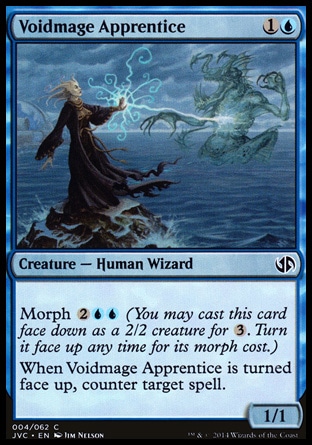
The rules do not ban you from using the special action — Unmorph, to trigger Voidmage Apprentice and to counter the opponent’s spell with Split Second as the trigger resolves.
And of course, don’t forget that by the time a spell with Split Second resolves, all of its targets may become illegal, which will lead to it getting fizzled:
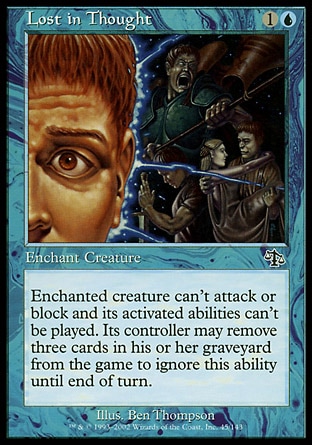
An opponent’s Extirpate targets a card of yours, and you still count on other copies of that card. If you control a creature enchanted with Lost in Thought, you may perform the special action and exile the target of Extirpate as one of the three (not less!) necessary cards.
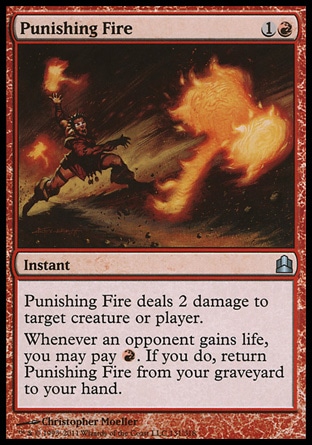
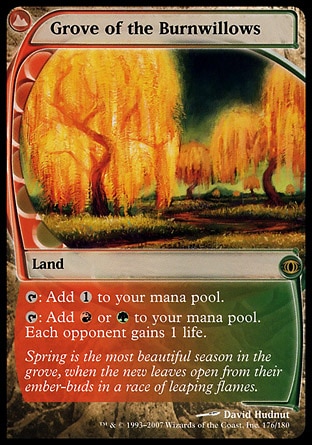
If you control Grove of the Burnwillows, and Punishing Fire is in your graveyard, a smart opponent wouldn’t target your Punishing fire with his or her Extirpate, because in response to the Extirpate you would activate the Grove’s mana ability which will not only give you red mana, but also grant life to your opponent. That in its turn triggers Punishing Fire, and as the trigger resolves, you pay the mana earned right there to get the card back to your hand. This way, Extirpate doesn’t resolve because its only target becomes illegal.
Since the spell produces no effect, your opponent won’t search for anything and won’t be allowed to look into your hand and library. You will not get to shuffle your library.
What can be added to the stack when a spell with Split Second is there?
A copy of a spell or ability! Or a trigger.
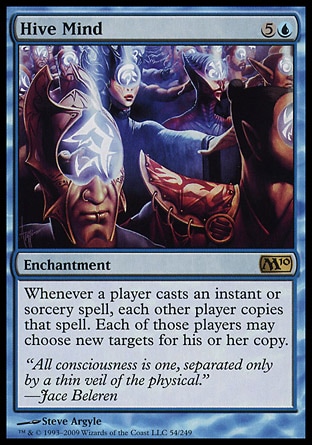
As soon as your cunning opponent casts an instant or sorcery spell with Split Second, Hive Mind’s trigger will go off. As it resolves, you copy that spell. The copy isn’t cast in this case, it is just placed on the stack.
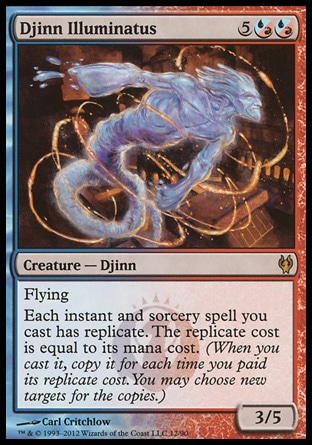
If you control Djinn Illuminatus, all your instants and sorceries have Replicate, whence the Replicate cost is equal to the mana cost of the original spell.
This means you may cast your Extirpate by paying Replicate’s additional costs and get several copies of Replicate. Only the original spell will have been cast. Copies produced by Replicate ability aren’t cast, they are simply placed on the stack above the original spell as the Replicate trigger resolves.
As Extirpate resolves, its controller performs a search in the graveyard, hand and library of the player whose card was targeted.
I believe it is a proper moment to answer a few questions on the information being revealed to the player as the library search is to be performed.
— I have just resolved Brainstorm, and I don’t want the opponent to see which two cards I have put on the top of my library. May I shuffle my library before passing it to my opponent for the search?
— You may not. You cannot just shuffle your library with no reason. This is Gameplay Error — Game Rule Violation. It will earn you at least a Warning in events at Competitive Rules Enforcement Level. A far worse result is rather likely, for a deliberate rule breach in order to gain advantage is considered to be Cheating and punished with Disqualification.
— Can an opponent resolving Extirpate take notes of the contents of my hand and library?
— Yes, but he or she is supposed to do it very quickly, otherwise such actions fall under the definition of Tournament Error — Slow Play. As a rule, the player without supernatural abilities will have just enough time to copy the contents of your hand and several crucial cards in your library. He or she will not be able to copy the contents of your entire library. If your cunning opponent boasts phenomenal visual memory, he or she might perform all the necessary actions within reasonable time, and take notes later. By the way, such notes may be used only during your match and between matches.
— May I surrender to prevent the player from resolving Extirpate?
— Certainly! Any player may surrender at any time. This action doesn’t use the stack :) The game will end immediately, and your opponent won’t have the opportunity to look through your deck.
Extirpate’s effect instructs its controller to perform a search in an open zone (graveyard) and in hidden zones (hand and library). Since cards with certain characteristic are sought for (with the same name as the target card), the player must find all such cards in the graveyard, and may fail to find such cards in hand and library, even if all players can see those cards through a related effect.
Suppose a card in Extirpate’s controller’s graveyard is chosen as the target for Extirpate is changed (which is possible through, say, Willbender’s trigger). He will have to exile all such cards from his graveyard, but he may keep all such cards in his hand and library.
If your cunning but not so attentive opponent simply overlooks a card in your hand or graveyard, this is not an error in terms of the rules. You may cast it legally.
All found cards hit the exile face up.
Then the player whose library has been searched shuffles it. Even in the case where Extirpate’s controller decides to "fail to find" the cards there and simply doesn’t look into it (see above about change of target).
Translated by Witas Spasovski

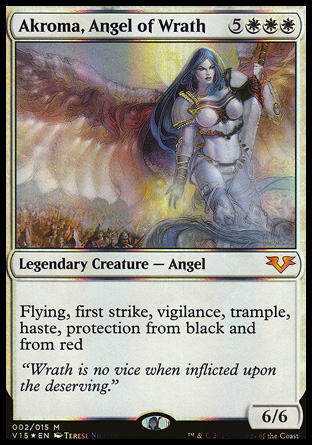
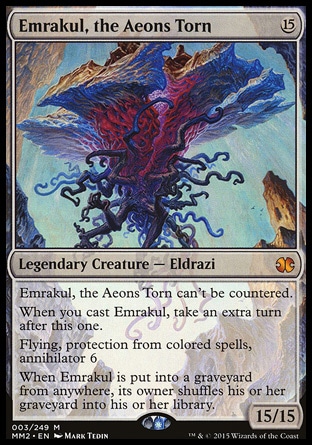
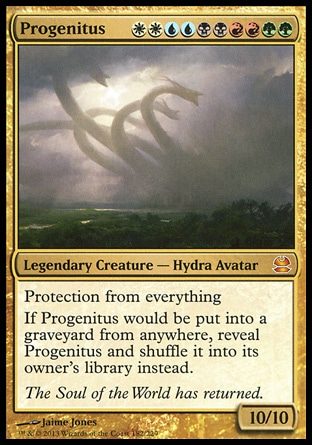
Any of these cards in a graveyard is a legal target for Extirpate.
I believe Akroma isn’t a question at all.
Emrakul should be targeted in response to its trigger, then it (and other copies of itself) may be exiled before the owner has the opportunity to shuffle it into his or her library.
The Hydra is pretty hard to get into the graveyard (Humility can help with that), but if it does end up there, Protection from everything won’t save it.